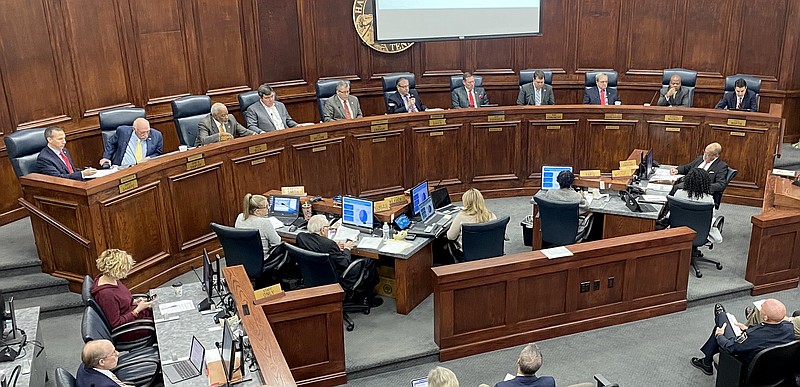Hamilton County Mayor Weston Wamp apparently didn't see the hornet's nest he was about to run into when he suggested the county reallocate 4.2% of the federal American Rescue Plan Act (ARPA) money the county was awarded in 2021.
In last Wednesday's Hamilton County Commission agenda meeting, he suggested the county take $3 million of the $53 million that had been allocated to the county Water and Wastewater Treatment Authority (WWTA) from the federal funds (and subsequent grants) and use it for more pressing projects.
The $3 million, Wamp suggested, was for a WWTA project that was far in the future, would not interfere with WWTA's ability to end all sewer moratoriums in place and ultimately could be done cheaper with county money without federal strings attached.
He laid out a group of projects the $3 million would be divided among, including $500,000 for a 40/40/40 community development program that would primarily benefit the Black community; $500,000 for La Paz, an organization that assists the Hispanic community; $500,000 for lights for the East Hamilton High baseball and softball fields; $500,000 for highway reflector markers for dark roads across the county; and $250,000 for Clinica Medicos, a medical clinic serving the Hispanic community.
Wamp said it would be a chance to fill immediate needs versus a project long in the future.
The reactions to his proposal were quick, varied and lengthy. Though no votes were taken, it was uncertain the resolution reallocating the money could get a majority of votes from commissioners this week.
The dispute is another in a series of turf battles between Wamp and the commission that -- despite what both say they want -- never seem to resolve.
They began shortly after his swearing-in with the mayor eschewing the money the commission wanted to spend to enlarge the dais and give him a seat on it. And they have continued with the now-months long dispute over the mayor's ability to fire County Attorney Rheubin Taylor.
It seems that if the mayor proposes it, it must be opposed, or at least picked to death.
We would argue it is the commission's job to do just that -- ask good questions, protect the taxpayers and look at all sides. But with Wamp and this commission, it seems almost a game.
The first to get sideways with the proposal was District 4 Commissioner Warren Mackey, who suggested nothing in the proposal benefits his district, which he claimed was the "poorest, most neediest" in the county.
Wamp, in turn, said the 40/40/40 program would benefit people in District 4, as would the projects for the Hispanic community.
Next came the argument from Commissioners Steve Highlander of District 9, Ken Smith of District 3, David Sharpe of District 6 and Joe Graham of District 11 that removing money from infrastructure was breaking promises and could harm the county in the long run.
"As this commission has stated previously on other topics ... we will stand by our commitments and our resolutions," Sharpe said. "And I think, you know, as the commission resolved previously, we should not be clawing money back that we've committed to other organizations. I think it sets a very bad precedent ... and it's my opinion that this presents a real sense of instability in Hamilton County government. ... I think this is bad business."
Finally came the reasoning from Commission Chairman Chip Baker, Graham and Mackey that if money is to be reallocated, reallocation choices should made by commissioners. They all, to a man, agreed the projects Wamp suggested were worthy, but said many others were equally worthy.
"I think it'd be wise for us to put aside that money if this goes through," said Baker, "to let other people apply that are also worthy. ... I appreciate how you're trying to give something for everyone, but I just don't understand the process. I really don't."
Others said the projects Wamp wants could be funded either through the 2024 budget or through tapping the county's $146 million rainy day fund.
We see the ongoing disputes as partly a problem of communication and partly of power.
Wamp, in making his presentation, repeatedly criticized the previous administration's allocation of ARPA funds, referring to organizations that were "overlooked," "an oversight" of distribution and suggesting he had "strong feelings about how these monies were allocated."
Although only four members of the previous commission now remain, no commission wants to hear that its decisions were made haphazardly or were wrong.
Wamp, for his part, might have trimmed his criticism.
Which branch of government proposes how county money is to be spent also continues to be a question.
Wamp brought the spending reallocation to the commission, and several commissioners indicated they didn't get their chance to suggest projects.
"It seems like the commission ought to be making the [spending] decisions," Mackey said.
By Wednesday, perhaps the mayor will get the majority he needs. But it's clear there remains wide disagreement about exactly how commission business should get done.
